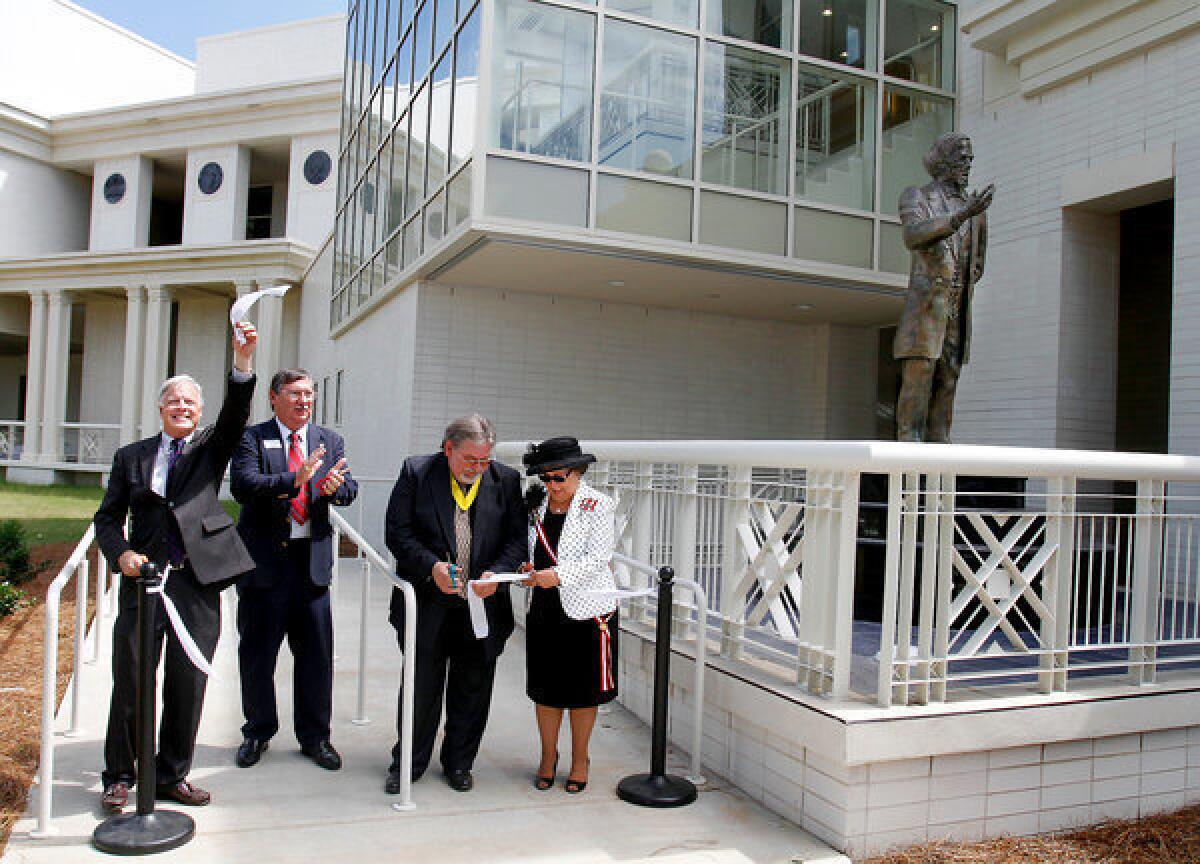Jefferson Davis Presidential Library: Still fighting the Civil War

- Share via
There’s been a skirmish or two in the comments on my recent Op-Ed article on the Jefferson Davis Presidential Library in Biloxi, Miss.
One commenter -- “Oceaneagle” -- pointed out that some thousands of blacks did serve in the Confederate army. Is that enough to undermine my claim that an emphasis on black Rebels is “nonsense”?
I’d like to start my answer by saying a bit more about Richard Forte, the Davis library’s chairman of the board and my tour guide during my visit. Forte is an enormously likable guy, in part because of his passion for the particulars of Southern history. He joined the Sons of Confederate Veterans in 1975 as the great-great-grandson of a corporal in the Southern cavalry. When, after decades of searching, he found that relative’s grave, Forte put together a memorial service that included a historically accurate meal, a color guard of reenactors, a few female reenactors dressed for mourning, and what he admitted was a pretty emotional speech he delivered himself.
It’s easy to see why Forte gets tired of people reflexively bashing the South, whether about the Civil War or about current events.
The most popular counter to such criticisms used to be that the Confederacy fought not for slavery but for states’ rights. But historians have thoroughly undercut this view, and Forte, to his credit, did not echo it. “The war wasn’t just about states’ rights,” he told me. “It was about a lot of things.”
One of the South’s new counterarguments, as I pointed out in my Op-Ed, is to talk about black Confederates. After all, their presence can bolster the states’ rights argument (how could the war have been about slavery if slaves fought for the South?) and can humanize the South’s image (how could slaves have been mistreated if they fought for the South?).
It’s crucial to keep this motivation in mind when surveying the data on black soldiers. There’s no question that ex-slaves did fight for the Confederacy, though we’ll never know the exact number nor their exact roles. Another commenter, “GregMaragos,” helpfully linked to the work of John Stauffer, a Harvard history professor who suggests there were more than 3,000 but fewer than 10,000 black soldiers. When I cited “historians’ best estimates,” I was thinking of Stauffer’s research.
But there’s a big difference between that and the Sons of Confederate Veterans’ research, which digs feverishly to find as many sympathetic black Confederates as possible. (Ervin Jordan, another historian, told the Washington Post that “scholars are nearly unanimous in calling these accounts of black Confederate soldiers a misrepresentation of history.”)
I think it’s more important to consider why the Sons now care so much about this specific issue, and why they care about it without also caring about, say, the way a lifetime of slavery might warp a person’s motives, or the way the South abused the Northern black soldiers it captured.
In short, the Sons want to spin one small data point until it bolsters the Lost Cause. Why else, in a war that featured millions of people (and millions of stories), would we focus on black Confederate soldiers, who were after all the exception, not the rule?
I happen to agree with Forte, at least in part, that the media and the academy unfairly slight the South. But the best way to combat this perception is not to seize on a few small details that support a preexisting agenda. The South’s partisans need to stop focusing on bizarre side shows like black soldiers; they need to stop branding the Davis library as if a Confederate president were a U.S. president.
What they need is a response that doesn’t start from a place of frustration and anger -- a response that’s historical first, not personal.
ALSO:
At White House, liberal hawks ascend
Brave new world of government surveillance
The assassination of Bobby Kennedy, through the eyes of a college girl
More to Read
A cure for the common opinion
Get thought-provoking perspectives with our weekly newsletter.
You may occasionally receive promotional content from the Los Angeles Times.






